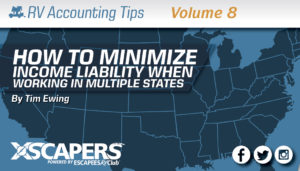Tag: Remote Work Taxes
-

Tax Implications for Companies With Remote Workers
The remote workforce has expanded as rapidly and as surprisingly as a...
Continue Reading -

Your Complete Guide to Tax Implications for...
Countless people have joined the remote workforce during the pandemic, many with...
Continue Reading -

RV Accounting Tips – How to Minimize...
When discussing multi-state income tax, for most working RVers we usually encounter...
Continue Reading -

RV Accounting Tips – Can you Deduct...
Taxes and Accounting for Full-Time RVers Working on the Road |By Lindsey...
Continue Reading -

Working from Your RV in Multiple States...
| By Lindsey Nubern and Adam Nubern | DISCLAIMER: The information and...
Continue Reading






